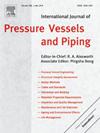The longitudinal mechanical behavior of steel pipes with pitting corrosion under the coupling effect of complex service loads
IF 3
2区 工程技术
Q2 ENGINEERING, MECHANICAL
International Journal of Pressure Vessels and Piping
Pub Date : 2024-12-24
DOI:10.1016/j.ijpvp.2024.105423
引用次数: 0
Abstract
Corrosions on the outer walls stand as the primary cause of decreased structural integrity in steel water supply pipes. Pitting corrosion is identified as one of the most severe corrosion types. The failure risk of steel pipes with pitting corrosion significantly increases under the effects of complex service loads. In this study, full-scale tests of steel pipes with pitting corrosion on the outer wall under complex service loads were conducted. FE models capable of simulating the spatiotemporal interplay between the corroded steel pipe-soil structure and the pressurized fluid inside the pipe were developed. Comparative analysis was performed on the measured and simulated longitudinal strains and bending moments under complex operational loads for corroded and intact pipes. The impact of traffic loads, internal pressure, groundwater levels, and normalized corrosion parameters on the longitudinal Von Mises stress and bending moments of corroded steel pipes was investigated. The results indicate that, under standard corrosion parameters, the peak longitudinal Von Mises stress and positive bending moment at the crown of corroded pipe increase by 64.3 % and 397.3 %, respectively, compared to intact pipes. The corrosion depth has a more significant effect on the peak longitudinal Von Mises stress and positive bending moment than corrosion width and corrosion length. As the corrosion depth increases from 0.2 to 0.8, the peak longitudinal Von Mises stress and positive bending moment at the crown increase by 175.9 % and 193.4 %, respectively, while the negative bending moment is largely unaffected by corrosion geometric parameters. Increasing traffic loads from 0.4 MPa to 1.2 MPa results in increases of 23.3 %, 148.5 %, and 198.1 % in the peak longitudinal Von Mises stress, positive bending moment, and negative bending moment, respectively. Internal pressure increasing from 0.1 MPa to 1.0 MPa leads to increases of 328.8 % and 81.9 % in the peak longitudinal Von Mises stress and positive bending moment, respectively, with negligible changes in the negative bending moment. When the groundwater level rises from 600 mm below the bottom to 600 mm above the crown, the vertical displacement at the crown increases by 66.9 %.
求助全文
约1分钟内获得全文
求助全文
来源期刊
CiteScore
5.30
自引率
13.30%
发文量
208
审稿时长
17 months
期刊介绍:
Pressure vessel engineering technology is of importance in many branches of industry. This journal publishes the latest research results and related information on all its associated aspects, with particular emphasis on the structural integrity assessment, maintenance and life extension of pressurised process engineering plants.
The anticipated coverage of the International Journal of Pressure Vessels and Piping ranges from simple mass-produced pressure vessels to large custom-built vessels and tanks. Pressure vessels technology is a developing field, and contributions on the following topics will therefore be welcome:
• Pressure vessel engineering
• Structural integrity assessment
• Design methods
• Codes and standards
• Fabrication and welding
• Materials properties requirements
• Inspection and quality management
• Maintenance and life extension
• Ageing and environmental effects
• Life management
Of particular importance are papers covering aspects of significant practical application which could lead to major improvements in economy, reliability and useful life. While most accepted papers represent the results of original applied research, critical reviews of topical interest by world-leading experts will also appear from time to time.
International Journal of Pressure Vessels and Piping is indispensable reading for engineering professionals involved in the energy, petrochemicals, process plant, transport, aerospace and related industries; for manufacturers of pressure vessels and ancillary equipment; and for academics pursuing research in these areas.

 求助内容:
求助内容: 应助结果提醒方式:
应助结果提醒方式:


